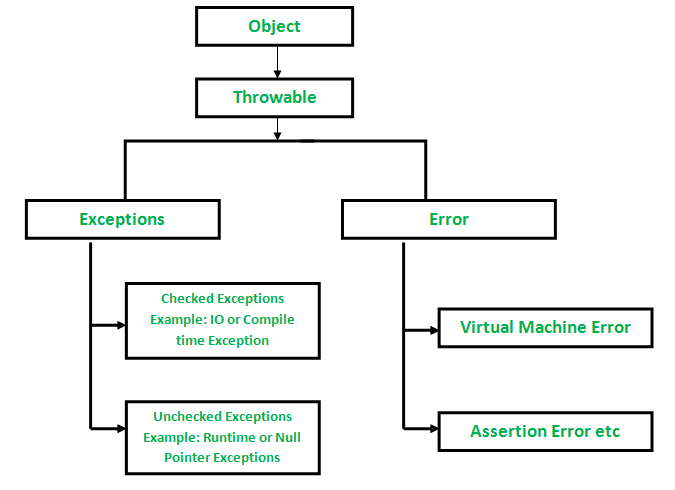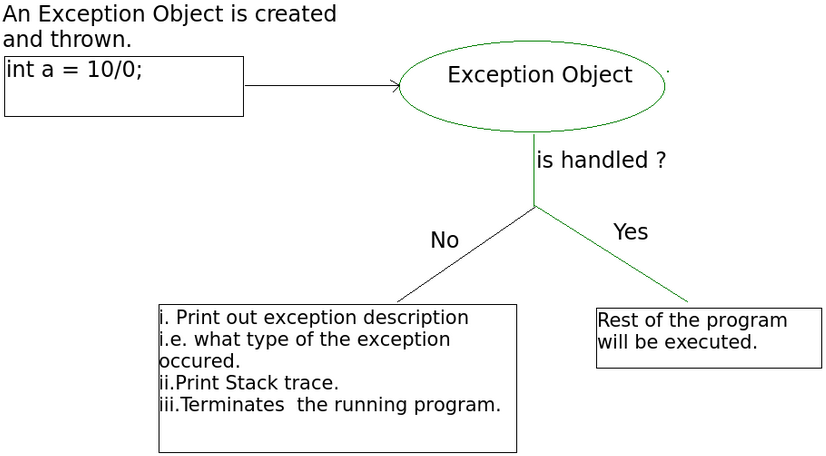Exceptions Handling in Java
What is an exception in Java ?
- It is an unwanted or unexpected event, which occurs during the execution of a program i.e at run time.
- It disrupts the normal flow of the program’s instructions.
Error vs. Exception
- Error : indicates serious problem that a reasonable application should not try to catch.
- Exception : indicates conditions that a reasonable application might try to catch.
Exception Hierarchy :
- All exception and errors types are sub classes of class
Throwable, which is base class of hierarchy. - Exceptions Branch:
- It is used for exceptional conditions that user programs should catch.
- Example: NullPointerException
- Error Branch:
- Used by the Java run-time system(JVM) to indicate errors having to do with the run-time environment itself(JRE).
- Example: StackOverflowError

Checked vs. Unchecked Exceptions
Checked Exceptions :- Those exceptions are checked at compile time.
- If some code within a method throws a checked exception, then the method must either handle the exception or it must specify the exception using throws keyword.
- Examples: FileNotFoundException, IOException
Unchecked Exceptions:- Those exceptions are not checked at compiled time.
- Exceptions under Error and RuntimeException classes are unchecked exceptions, everything else under throwable is checked.
Exception Handling
- In java exceptions are handled either by the programmer or by default by JVM.
Exception Handling by JVM :
-
Whenever inside a method, if an exception has occurred, the method creates an Object known as Exception Object and hands it off to the run-time system(JVM).
-
The exception object contains name and description of the exception, and current state of the program where exception has occurred.
-
Creating the Exception Object and handling it to the run-time system is called throwing an Exception.
-
There might be the list of the methods that had been called to get to the method where exception was occurred.
-
This ordered list of the methods is called Call Stack.
-
Now the following procedure will happen:
-
The run-time system searches the call stack to find the method that contains block of code that can handle the occurred exception. The block of the code is called Exception handler.
-
The run-time system starts searching from the method in which exception occurred, proceeds through call stack in the reverse order in which methods were called.
-
If it finds appropriate handler then it passes the occurred exception to it. Appropriate handler means the type of the exception object thrown matches the type of the exception object it can handle.
-
If run-time system searches all the methods on call stack and couldn’t have found the appropriate handler then run-time system handover the Exception Object to default exception handler , which is part of run-time system. This handler prints the exception information in the following format and terminates program abnormally.
Exception in thread "xxx" Name of Exception : Description ... ...... .. // Call Stack
-
Example-1 : Handled Exception
class ExceptionThrown {
// Throws the Exception(ArithmeticException), but Appropriate Exception handler is not found here
static int divideByZero(int a, int b){
// this statement will cause ArithmeticException(/ by zero)
int i = a/b;
return i;
}
// RunTime System searches the appropriate Exception handler in this method also but couldn't have found.
// So looking forward on the call stack.
static int computeDivision(int a, int b) {
int res =0;
try {
res = divideByZero(a,b);
}catch(NumberFormatException ex){ // doesn't matches with ArithmeticException
System.out.println("NumberFormatException is occured");
}
return res;
}
// In this method found appropriate Exception handler i.e. matching catch block.
public static void main(String args[]){
int a = 1;
int b = 0;
try {
int i = computeDivision(a,b);
} catch(ArithmeticException ex) { // matching ArithmeticException
// getMessage will print description of exception(here / by zero)
System.out.println(ex.getMessage());
}
}
}
Output:
/ by zero.
Example-2 : Unhandled Exception
class ThrowsExecp {
public static void main(String args[]){
String str = null;
System.out.println(str.length());
}
}
Output:
Exception in thread "main" java.lang.NullPointerException
at ThrowsExecp.main(File.java:6)
Exception Handling by Programmer :
- Java exception handling is managed via five keywords:
try,catch,throw,throws, andfinally. - Briefly, here is how they work :
- Program statements that we think can raise exceptions are contained within a try block.
- If an exception occurs within the try block, it is thrown and our code can catch this exception (using catch block) and handle it in some rational manner.
- System-generated exceptions are automatically thrown by the Java run-time system. To manually throw an exception, we use the keyword throw.
- Any exception that is thrown out of a method must be specified as such by a throws clause.
- Any code that absolutely must be executed after a try block completes is put in a finally block.
How to handle exception ?
try {
// block of code to monitor for errors the code you think can raise an exception
} catch (ExceptionType1 exOb) {
// exception handler for ExceptionType1
} catch (ExceptionType2 exOb) {
// exception handler for ExceptionType2
} finally { // optional
// block of code to be executed after try block ends
}
Important Points :
- In a method, there can be more than one statements that might throw exception, So put all these statements within its own try block and provide separate exception handler within own catch block for each of them.
- If an exception occurs within the try block, that exception is handled by the exception handler associated with it. To associate exception handler, we must put catch block after it. There can be more than one exception handlers. Each catch block is a exception handler that handles the exception of the type indicated by its argument. The argument, ExceptionType declares the type of the exception that it can handle and must be the name of the class that inherits from Throwable class.
- For each try block there can be zero or more catch blocks, but only one finally block.
- The finally block is optional.It always gets executed whether an exception occurred in try block or not . If exception occurs, then it will be executed after try and catch blocks. And if exception does not occur then it will be executed after the try block. The finally block in java is used to put important codes such as clean up code e.g. closing the file or closing the connection.
Summary :
